2017 Devinci Django Carbon 29 SLX/XT
(discontinued)
| Where To Buy | |||
|---|---|---|---|
Free shipping on orders over $50 (continental U.S. only).
International shipping available. Some exclusions apply. |
|||
Free shipping on orders over $50 (continental U.S. only).
International shipping available. Some exclusions apply. |
|||

The Devinci Django was born as a completely new bike in early 2016, first with 27.5-inch wheels and later joined by 29-inch version. As the brand's first attempt to create a truly worthy 120mm travel trail bike, we couldn’t wait to see if the Django was ready to be unchained. We headed to Tucson, Arizona for Vital MTB Test Sessions to give it a proper go in a wide variety of terrain.
Highlights
- Carbon DCM-G frame
- 29-inch wheels
- 120mm (4.7-inches) of rear wheel travel // 130mm (5.1-inches) fork travel
- Split Pivot suspension design
- Tapered headtube
- Internal cable routing
- FRG Cup compatible
- Two-position adjustable geometry
- Sealed Enduro bearings
- Press Fit bottom bracket shell with ISCG05 mounts
- Boost 148mm rear spacing with 12mm through axle
- Measured weight (size XL, no pedals): 28.5 pounds (12.94kg)
- MSRP $5,129 USD

Built around Dave Weagle's proven Split Pivot suspension design, which is said to separate acceleration forces from braking forces, the bike was crafted to be a trail worthy pedaling machine. The linkage rotates very freely on sealed Enduro brand bearings, helping to add small bump compliance in conjunction with the 7.25x1.75-inch FOX Float Factory shock with an EVOL air sleeve.
The almost full carbon fiber frame, with alloy chainstays, mimics the clean design of Devinci’s other carbon trail bikes and features the same thoughtful internal cable routing all around. It's a dedicated 1X drivetrain bike complete with a Press Fit bottom bracket and ISCG tabs for those looking to add a chainguide. That shiny finish is protected by rubber guards on the chain and seat stays.
|
|
|
|
Features also include a tapered headtube and water bottle mount inside the front triangle. Like many bikes these days, Devinci has chosen to bump up to the new Boost 148mm rear axle standard and pairs it with a Boost fork as well, adding stiffness to the larger 29-inch wheels. With the stock 2.25-inch wide Maxxis rear tire there is excellent mud clearance with enough room to add up to a 29 x 2.4-inch tire for those looking for a little more meat.
Devinci offers the Django 29 in six different builds, two of which make use of an aluminum frame. Prices range from an affordable $3,099 to a SRAM Eagle-equipped build at $6,819, with our SLX / XT test bike slotting in at $5,129. Those looking to create something custom can start with the aluminum frame + shock kit at $1,769 or make the leap to carbon for $2,479.
Geometry

The Django is tunable to rider preferences and terrain through two geometry adjustments - a $20 headset spacer and an eccentric pivot located at the top of the seatstays. Known as the "FRG cup," the optional spacer is installed between the head tube and the fork’s crown, effectively raising the front end by 10mm. This results in a 0.5-degree head tube angle change, as well as raising the bottom bracket by 3mm. Why did Devinci make this? Simply to widen the user base of each of their bikes, allowing riders with different demands to utilize the same frame.
The frame itself features Devinci's standard FRG geometry adjustment at the rocker link / seat stay pivot. With the addition of the headset spacer three head angles are possible in 0.5-degree increments from 67.5 to 68.5-degrees, depending on how you set the bike up.
It's available in sizes small through XL, which they say accommodates riders from 5' to 6'4" (1.52 to 1.93m) tall. With a 6'0" (1.83m) tall tester who prefers long bikes and another 6'5" (1.96m) rider, our testers settled on a size XL. The numbers are highlighted by a nice upright 74.5/75-degree seat angle, 434/432mm chainstays, and healthy reach values across the board. We measured the bottom bracket height ~7mm lower than claimed at 327mm in the low setting without the FRG cup.
Suspension Analysis by André Santos
Using the bike industry's leading linkage analysis software, André Santos, the Youtube suspension whiz, was able to determine a close approximation of the the Django 29's kinematics for the purpose of this review. These charts provide great insight into several key factors that impact how it rides. Those unfamiliar with these types of graphs should watch André's excellent series of suspension fundamentals videos. The results of his analysis are as follows:
|
|
|
|
Observations:
- Enough progressivity for a 120mm trail bike at 17%.
- Good pedaling efficiency while using a 30-tooth chainring with anti-squat values around 110% on bigger cogs. On smaller cogs the anti-squat can be slightly excessive. The anti-squat values are better optimized for a 34-tooth chainring and 1x12 transmission.
- Pedal kickback is proportional to the amount of anti-squat. This suspension design works as a single pivot regarding pedaling characteristics, therefore the anti-squat values remain quite high over the whole travel and consequently the amount of total pedal kickback is higher than in similar bikes.
- Anti-rise is around 55% at sag, meaning that the suspension is quite isolated from braking forces.
- Overall it’s a moderately progressive trail bike with the best pedaling traits when paired with a 34-tooth chainring.
Did the facts and figures correlate to our ride time? Let's find out...
On The Trail
The gnarly desert terrain of Tucson was rugged, scrappy, and a bit of a dirty fighter. Loose decomposing granite, fast yet slow techy radness, and the occasional cholla cheap shot were offered up by Mount Lemmon's Incinerator Ridge, Green Mountain, Bug Springs, and Prison Camp trails. It was the perfect proving ground for the Django.
Starting with the recommended 30% sag and a touch of compression from the rear shock adjustments, we found the initial setup to be trail ready quickly and easily. The baseline tune and recommended sag value was spot on, and it was only after finding out the Django was so capable that we added some more pressure to the fork just to keep up with the rear end's performance.
Initially setting out on the Django, the reach was nicely balanced, not too long and certainly not cramped. The stock 800mm Race Face Atlas handlebar and 50mm Turbine stem was spot on for our taller testers and allows riders to trim things down for a personalized fit. The general out of the box fit was comfortable and easy to quickly feel confident on the bike.

We tested the Django exclusively in the slack and low geometry setting, but did not make use of the optional FRG headset cup. At a 68-degree head angle with a measured 327mm bottom bracket height, this position suited the technical Tucson trails well and we didn’t find the geometry compromised the bike's climbing ability. The bottom bracket height wasn't too low while pedaling as we didn't have any issues with smashing cranks and pedals. Because the Django maintains XC-like pedaling performance, it's nice to have the option to go steeper with the head tube for smoother, faster, and rolling terrain. The 480mm reach matched with the 434mm chainstays provided a nice, neutral body position and allowed us get quickly adjust our line while maintaining stability. While slightly steeper than some of the competition, the overall geometry of the Django was well balanced for great climbing and descending performance.

Letting the Django go on descents had us quickly excited and impressed on it's ability to handle gnarly terrain. Initially we were a bit tentative to push it in steep and rocky sections of trail, but we couldn't help ourselves and pushed it harder and harder in corners and technical features. On smoother sections of trail the Django was fast, agile, and really fun. Loads of pop and maneuverability had us hootin’ and hollerin’. It's also able to absorb chattery and continuously rocky sections without issue, and combined with good support it feels both fast and stable. There were points in the test when we felt that we’d gone too far, but surprisingly the Django had just enough left to save the day. The carbon frame was stiff and responsive to rider input making direction changes quick and precise. The progressive, poppy feel allowed us to nail front and rear wheel placement in slow tech, quickly navigating sections of the trail where good lines didn’t exist.
On smoother sections of trail the Django was fast, agile, and really fun. Loads of pop and maneuverability had us hootin' and hollerin'.
The rear suspension proved to be very capable and seemed to ride well outside the bike's 120mm of travel. You'll find a single volume spacer inside the rear shock, helping to add some ramp to the gently progressive suspension design. Remaining smooth off the top for reliable traction and small bump compliance, yet maintaining ample mid-stroke support, the Django rode comfortably at the 30% sag point. The bike stayed high in its travel through hard corners, and when the suspension was loaded we found the bike wanted to pop out of the turns with excellent exit speed. Due to the Split Pivot on the rear axle, the suspension was unaffected by heavy rear braking which allowed the rear shock to properly handle steeper chattery sections of trail. Overall the Django proved it’s trail worthiness by descending well beyond our expectations for this travel range.
The rear suspension proved to be very capable and seemed to ride well outside the bike's 120mm of travel.
Headed back up the the hill, the 28.5-pound (12.94kg) Django had a light and snappy feel. Due to the nature of the design, pedal inputs kept the rear suspension high in its travel allowing for a good mix of pedaling efficiency and traction optimization with the shock fully open. Under heavy pedal loads on the steeps or while sprinting out of a turn the bike was responsive and efficient. With plenty of room in the cockpit, the bike provides a nice balanced climbing position both seated and standing. It's comfortable on longer climbs, settles in well, and really compliments the descending capabilities nicely.
Build Kit
The mid to high-end build of the Django Carbon SLX/XT is a solid mix of value oriented components for a good balance of durability and function. At $5,129, the build is reasonably priced in combination with the mostly carbon frame. This build kit doesn't feature any funky proprietary parts making it easy to upgrade or change out parts down the line. With exception to the now relatively short 125mm travel RockShox Reverb dropper post, the SLX/XT build kit is good to go and we didn’t feel like Devinci made any big oversights.
|
|
|
|
Sporting the 130mm travel FOX Float 34 Performance Elite front fork with the FIT 4 damper up front, the Django features the latest in damping performance and adjustability but holds its value by not featuring Kashima coated stanchions. The Float 34 was a solid match for the Django providing a worthy amount of stiffness and was smooth throughout the travel. Featuring high and low-speed compression and rebound adjustably, we had no issues finding the right tune for varying terrain. The fork performed well during the test leaving us confident in its future reliability.
Devinci went with tubeless ready EXO casing Maxxis tires front and rear. Out front, the 2.3-inch High Roller II 3C tire was great for maintaining traction in corners and braking. The square profile and large side nobs railed through the loose over hard decomposed granite and held a line well. Out back, the 2.25-inch Maxxis Ardent was fast rolling, but was a little bit under-gunned for the loose terrain. We found that it broke traction fairly easy on climbs and didn’t provide great braking traction on descents. Although we would probably swap the Ardent out for something a little more traction oriented, the EXO casings complimented the Django’s descending and climbing ability, proving to be durable throughout the test and not overly heavy.
Featuring a 24mm inner width and respectable engagement, the Django is fit with Race Face Aeffect SL24 Boost wheels. The wheels are tubeless ready but require an additional tubeless kit to get them set up tubeless. At a reasonable 1,790g, the hoops matched the climbing performance of the Django fairly well, however we found that the stiff carbon frame and supportive suspension highlighted the flexy nature of these wheels on the way down. On high g-force turns we could feel the wheels give a bit, and in chunky, chattery terrain they had a hard time holding a line. By the end of the test we had a few noticeable dents in the rear rim leading us to question their long-term durability.
|
|
Fit with Shimano SLX M7000 brakes with a 180mm and 160mm rotor front and rear, respectively, the braking performance of the Django was decent but a bit underpowered. Because of the Django’s large wheels and great descending capabilities, some larger and more aggressive riders may want to consider a bigger rear rotor.
Utilizing a mix of Shimano XT and SLX components, the drivetrain was crisp and performed well. The 11-42 tooth 11-speed rear cassette provided a wide enough range in combination with the 30-tooth direct mount Race Face narrow/wide chainring. The Django also features ISCG05 tabs for riders that want to add an upper chain guide for peace of mind, which is a nice option.
The Django was not completely noise free, which we chalk up to a bit of chain slap, some slight rattle from the internal dropper post routing, as well as the lack of any significant downtube protector.
Overall the SLX/XT kit proved worthy on the trail and a decent mix of durability and value. It seems to us that a larger rear rotor would be a reasonable ask without increasing the overall price. The Race Face Affect SL24 wheels are slightly more on the cross-country end of the spectrum in terms of flex and durability, and for our riding styles we think heavier, stiffer, and slightly wider wheels would be nice. Some riders may find these wheels to perform reasonably well and remain durable for a season or two. Other than a few minor tweaks, we’d take the Django as is.
Long Term Durability
We put the Django through it all and feel confident that Devinci made this bike to last. With the exception to the relatively small downtube protector, the stiff carbon frame did not hint at any weak points. Devinci doesn’t stray too far from the norm with their Split Pivot suspension design, so other than routine bearing maintenance the frame shouldn’t need anything out of the ordinary to keep it going strong. Aside from the wheels seeing some damage we felt the components were reliable for several hard months of riding. Devinci backs the frame with a generous lifetime warranty.

What's The Bottom Line?
The Devinci Django 29 rips. Climbing among the best in this travel category and handling descents with confidence, the Django is the kind of bike that we could spend 90% of our time on. We were surprised how well it rallied in terrain we’d consider to be a little out of its league, ultimately performing well beyond our expectations. Nicely balanced geometry kept things comfortable for even the longest climbs, but also proved to be agile and responsive when it mattered most. The Django embodies the spirit and soul of modern mountain biking, making it a great choice for a wide range of riders and styles.
Visit www.devinci.com for more details.
Vital MTB Rating
- Climbing: 4 stars - Excellent
- Descending: 4 stars - Excellent
- Fun Factor: 5 stars - Spectacular
- Value: 3.5 stars - Very Good
- Overall Impression: 4.5 stars - Outstanding
Bonus Gallery: 31 photos of the 2017 Devinci Django Carbon SLX / XT up close and in action
About The Reviewers
Dylan Stucki - Age: 28 // Years Riding MTB: 17 // Height: 6'5" (1.96m) // Weight: 195-pounds (88.5kg)
"I'm a fun-haver, always looking for new ways to interpret the trail. Gettin' sidewayze and balls out fast is rad too!" Dylan brings some serious speed to the Vital test crew, a heavy dose of hijinks, and routinely breaks things you think can't be broken. He's been testing mountain bikes and parts for several years which gives him good perspective on the full spectrum of what's on the market.
Mint Henk - Age: 32 // Years Riding MTB: 18 // Height: 6'0" (1.83m) // Weight: 180-pounds (81.6kg)
"Ragged, with a hint of Neanderthal." We decided to bring Mint onboard after watching him absolutely rocket up and down Colorado's high country like it was no big deal. Meanwhile, we were huffing and puffing trying to keep up. Mint is the real deal, and he brings a fresh eye to the Vital MTB testing game backed with years of relevant experience.

About Test Sessions
For five years a dedicated crew of Vital MTB testers have been bringing you the most honest, unbiased reviews you'll find anywhere. This time around we rode 2017's most exciting trail, all-mountain, and enduro bikes on a wide variety of rowdy trails in Tucson, Arizona. Reviews can be accessed 24/7 in our Product Guide. Test Sessions was made possible with the help of Arizona Cyclist. Tester gear provided by Troy Lee Designs, Specialized, Five Ten, ZOIC, Sombrio, Race Face, and EVOC. All photos by Lear Miller.
Specifications
Rear: Maxxis Ardent 29" x 2.25" TR
Enduro Bearings
| Where To Buy | |||
|---|---|---|---|
Free shipping on orders over $50 (continental U.S. only).
International shipping available. Some exclusions apply. |
|||
Free shipping on orders over $50 (continental U.S. only).
International shipping available. Some exclusions apply. |
|||






















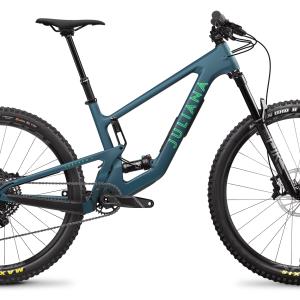


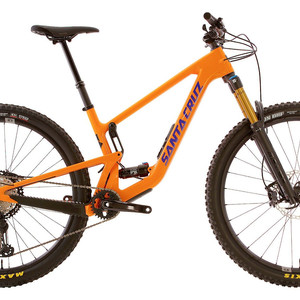
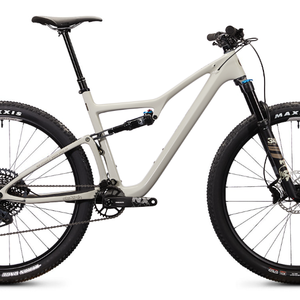
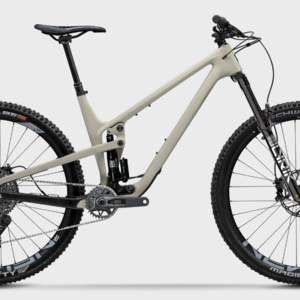
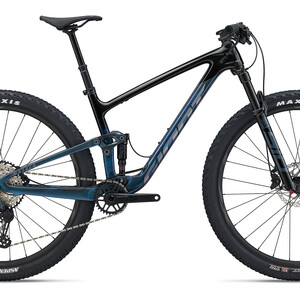



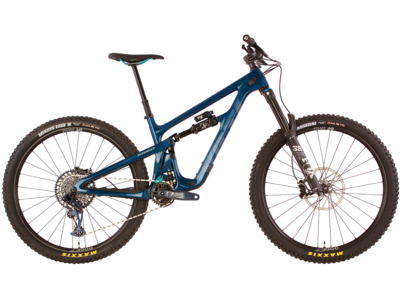



32 comments
Post a reply to: Review - 2017 Devinci Django from Vital MTB Test Sessions